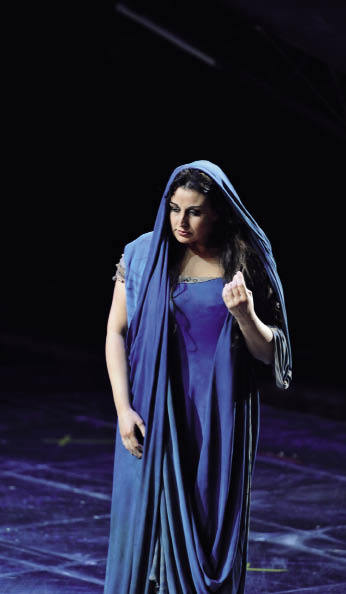Aida
Royal Opera House, in rep until 16 May
Powder Her Face
Linbury Studio, in rep until 12 May
In the programme for the Royal Opera’s new production of Aida, George Hall tells us that ‘the total number of complete or substantially complete recordings of Aida, made either live or in the studio, currently stands at over 250’, a statistic that shook me, hardened discomaniac as I am. There can’t be more than one or two other operas which achieve such a tally. What adds to my surprise is that Aida is so far from being Verdi’s finest opera, and that it does urgently need seeing as well as hearing. It seems to be more of a problem, or embarrassment, for producers, too, than his other most celebrated works, judging by the short lifespan of UK productions in the post-war period: the Royal Opera has tended to rest it for long periods, and then to put on an unrevived new production.
David McVicar is the latest director to try to make something fresh out of what one can’t help feeling is an old warhorse. As one might expect, he sheds as much of the fustian as he can: there is no marching and counter-marching, no animals; it’s a kind of anti-Veronese affair. The curtain rises on a large depressing dark-grey wall, which revolves very much as the equivalent set in McVicar’s Rigoletto does, to reveal an even more lowering reverse. Any suggestion of place is resolutely abjured, and there isn’t much of time either: costumes are eclectic in style and period, with one or two vague possible approaches to Ancient Egyptian, but mainly just Primitive. The point seems to be that what we’re witnessing is something close to a rite which might be performed anywhere and anywhen, though there are no modern allusions. In place of the familiar dances and marches — this music has dated irremediably — we get more of McVicar’s favourite scenes of gore and flesh: the Royal Opera’s website states, in bold, as warning or enticement, that there are dances in which there is ‘partial nudity’. Though dim lighting made what exactly was happening unclear, it seemed that a lot of sacrificing was going on, the kind of thing that Amneris rebukes the priests for in her grand series of final imprecations.
What we value Aida for now is chiefly the series of confrontations, in which the characters’ motivations are gradually revealed, and Aida’s arias, of which the first is urgent and anguished, the second nostalgic and poignant. Micaela Carosi at first seemed severely overparted, but by the end of the opera she was going strong. In ‘Ritorna vincitor!’ she lacked volume, and slipped alarmingly off pitch, without managing to regain it. But ‘O patria mia’ was exquisite, and so was its accompaniment.
Marcelo Alvarez was singing his first Radames, and made a better job of it than he has of most of the roles I have seen him in, too. He did his best to make ‘Celeste Aida’ interesting, and later on did some magically quiet singing. It’s not so much the tenor’s fault as the fault of the role that one can never see why Aida and Amneris are so enamoured of Radames. Marianne Cornetti was a good Amneris, especially after her feeble Eboli last year. She understands this fascinating role, only lacking the big guns which can make the Judgment scene the work’s electrifying climax. Marco Vratogna’s Amonasro was at best routine, and the finest male singing came from Robert Lloyd as the King. Nicola Luisotti conducted without mannerism, and the orchestral playing was possibly the evening’s most enjoyable feature. So there again, an Aida which isn’t a disaster but no thrill either.
The next evening I descended to the Linbury Studio for the revival of Thomas Adès’s Powder Her Face, with the same cast as in 2008, when this production was first mounted. My feelings about this opera were mixed before, but have hardened into irritation and distaste. Things aren’t helped in the Linbury by the almost complete unintelligibility of the words, which makes, for example, Rebecca Bottone’s Maid a trial: Adès has a penchant for squalling women, Ariel in The Tempest being the ultimate example. But the Maid runs him/her fairly close.
The intermittent comprehensibility apart, the determined chic of the piece does wear thin, as chic always does. Perhaps it will be fresh again in 50 years, rather as Noël Coward is proving, sometimes, to be now. But for the moment we have had our agreeable shock, admired and been amused by the pastiches and the patches of genuine originality, but there is nothing behind or beneath the brilliant surface, so for the present it exasperates. It is hard to think that it will ever be better produced and performed than this, though, and connoisseurs are advised to hurry along — there is even a matinée on 12 May, presumably for schools.






Comments